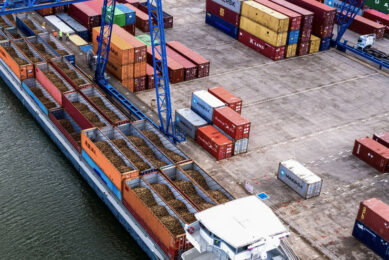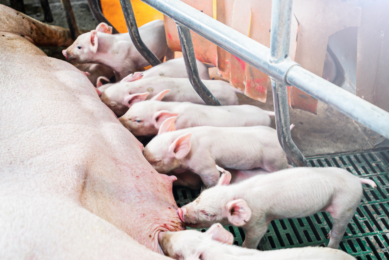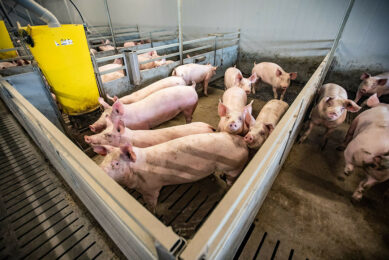UK’s new Mrs Pig sees, talks and learns

Sitting in the hot seat of the British pig industry as of this year is Meryl Ward. As chairman of the AHDB Pork, she emphasises the partnerships and handshakes to promote the UK’s pig industry further.
Working collaboratively with a number of different partners, involving other allied industries and whole supply chains, and then expanding the business by joining up with other enterprises is a recipe for success that has been used by some companies on the road to success.
It provides the ingredients for a prosperous pig industry, says the new chairman of the Agriculture and Horticulture Development Board (AHDB) Pork, previously known as the British Pig Executive (BPEX). She hopes to use all of these ingredients over the next five years.
Value for money
Meryl Ward, who took over the British pig industry’s ‘hot seat’ from Stewart Houston earlier this year, is a firm believer in working with allied industries and fellow producers wherever possible to get the best value for money and to get the best out of people. She is not afraid of stirring up things to win a more secure future for pig producers.
At the beginning of the century, she was a co-founder of the British Pig Industry Support Group, taking direct action against processing plants and retailers to force them to increase prices for pig farmers. Ward has also already proved that her partnership theory works on the just over 800 ha she farms in the UK. The farm has grown steadily over the years by learning from others and incorporating new income streams with new diversifications, such as retail, a farm contracting business and renewable energy enterprises.
Her father started with about 300 breeding pigs on their mixed farm in the 1970s. “When he died prematurely in 1979, I was the one who took them over – and we have grown to some 2,000 breeding pigs in our indoor unit here now by working together with other people, although in reality we are still a small player in the market.”
“We are so fortunate in the pig industry in that we are all fairly outward-looking people who like to travel to other countries to see what they are doing on their pig farms. I have visited units all over Europe and we have had many visitors here on our farm – and one is always learning by seeing and talking to others.”
Working closely
“Producers also need to understand and work more closely with nutritionists, vets, the transport sector, abattoirs and retailers. We can’t afford to work in silos; we need to join up all the dots for a successful industry,” says Ward, who is on the board of the UK’s multi-sector AHDB and believes it can help provide, or at least facilitate, all the opportunities the UK pig industry needs to move forward in this way.
With all its contacts across governments and different sectors in the UK and abroad, as well as its resources in other livestock sectors, the AHDB has already helped the pig industry boost its exports (a significant section of the British market) to third countries significantly, particularly China, which provided a period of reasonable price stability so that producers had the confidence and money to re-invest in their businesses.
When appointed AHDB Pork chairman, Ward said that she was ‘extremely excited’ by the opportunities for market development, innovation and growth for the industry, and that she looked forward to working with AHDB staff and board members, as well as producers, to make this a reality for the pig sector.
Meryl Ward: “My biggest wish is to oversee a joined-up retail supply chain.”
Exotic diseases
Speaking to Pig Progress, she says: “I am fortunate in that I have inherited a situation where the UK industry is in a better place now than it was few years ago,” though she hastens to add that “it is still facing several challenges, including the English breeding herd’s physical performance and the threat of exotic diseases entering the country, with the potential of compromising the country’s high health status and causing market disruption to our critical export markets.” She adds that the latter is also a good example of how a system of working together is essential to protect the country’s pigs against the threat of diseases such as Porcine Epidemic Diarrhoea (PED), Porcine Endogenous Retrovirus (PERv) and African Swine Fever (ASF).
“We all have to work together – the whole supply chain – to beat these dangers. It’s no good for the producers to improve their own biosecurity on their farms if the transport sector is not washing down its trucks properly or there is a slip-up at the abattoir,” explains Ward.
“We (the producers) have to get together with all the allied industries, as well as other agencies, the vets, government authorities and producers and officials in other EU countries, to keep exotic diseases out of this country. They all have a part to play and I am convinced we need to continue to work collaboratively to maintain our valuable health status.”
Best available research
“We need to do the same if we wish to have the best available research and development data at hand to help us flourish as an industry and move forward with the best building designs and management systems, which will provide us with the optimal environmental conditions we need in the UK and other EU countries to boost production and flourish as we move forward.”
Although the UK does not have a big R&D budget, working along with other European states in groups has been helping to spread best practice throughout the EU and has also helped countries to save time and money by avoiding the duplication of research work, she says. She points to an initiative such as the European Pig Innovation Group (EUPiG), which is an informal collaboration between a number of farming organisations who have agreed to work together to improve the co-ordination of existing knowledge and best practice methods for knowledge exchange from across European pig farming.
Yet Ward is adamant that, in spite of all these joint efforts and R&D teamwork, the UK pig industry was still sufficiently different from those in other countries to deserve its own distinctive research programme and she is determined to see this area of the industry expanded and strengthened and return to its former glory during her reign as the UK’s ‘Mrs Pig’.
Joined-up retail supply chain
In addition to maintaining Britain’s high health and welfare status and improving its performance by increasing the number of pigs per sow, Ward says her biggest wish is to oversee a joined-up retail supply chain. “A large proportion of our product goes to the supermarket sector and I am hoping we can all work together to pave the way to a virtuous circle in which the retail chain better understands what their customers want and those buyers appreciate the value of the products and are prepared to pay a decent price for it.”
“Then everybody will be happy, with satisfied customers and contented producers who will have enough money to fund sustainable businesses and the whole industry will be able to move forward and enjoy a prosperous future together.”
With the inspired gleam in the eyes of Meryl Ward, who is already well-known and respected across Europe and in the UK for her drive, determination and hard work, it would be a brave person who ventured to bet against her reaching these goals.
Meryl Ward
Meryl Ward and her husband Steve farm more than 800 ha in North Lincolnshire, UK. One of their two enterprises concerns indoor pig farming. The farm has recently invested in anaerobic digesters, which use farmyard manure and arable crops to produce electricity and heat. Ward was made a Member of the Order of the British Empire (MBE) for the improvement of pig welfare and was for many years a member of the Farm Animal Welfare Council. In 2010 she was presented with the David Black Award, for her ‘important and sustained contribution to the pig industry’.











